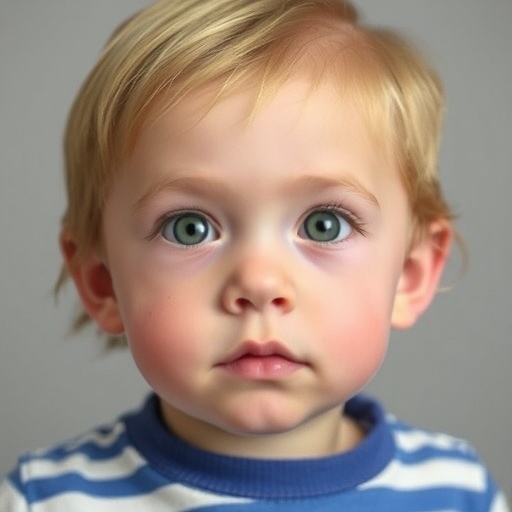In a groundbreaking study published in the Journal of Autism and Developmental Disorders, researchers Ma, Wang, and Li delve into the complexities of developmental prosopagnosia, a condition characterized by significant deficits in facial recognition. Their findings provide critical insights into how this specific cognitive impairment affects children between the ages of 7 and 14 years. As the research landscape around autism spectrum disorders (ASD) continues to evolve, understanding the intricacies of prosopagnosia can illuminate broader developmental trajectories in children with varying cognitive profiles.
Facial recognition is a fundamental social skill, enabling individuals to identify and connect with others in a variety of contexts. For many, the ability to recognize faces comes instinctively and is an essential part of daily interactions. However, for some children, particularly those diagnosed with developmental prosopagnosia, this vital function is severely impaired. The researchers embarked on an ambitious investigation to quantify the deficits experienced by these children and to explore the underlying mechanisms driving their unique challenges.
Using a combination of behavioral assessments and neuroimaging techniques, the team was able to evaluate not only the facial recognition capabilities of the participating children but also their overall cognitive functioning. The results were illuminating, revealing a marked difference in face-recognition tasks compared to neurotypical peers. In addition to clinical assessments, parent-reported measures provided a comprehensive view of how these challenges manifest in everyday life and social situations.
The study highlights that developmental prosopagnosia is not merely an incidental cognitive glitch; it encompasses a range of difficulties that have profound implications for social integration and emotional well-being. Children facing these challenges often struggle with understanding social cues, leading to potential isolation and difficulties in building peer relationships. The results of the study emphasize the need for targeted interventions to support these children in navigating a world that heavily relies on facial cues for social interaction.
Furthermore, the research offers a glimpse into how neural processes related to facial recognition may differ in children with developmental prosopagnosia. Advanced neuroimaging techniques unveiled atypical activation patterns in brain regions associated with facial processing. These findings not only deepen our understanding of cognitive deficits but also raise questions about the neurodevelopmental trajectory of facial recognition skills in children with this condition.
An essential aspect of the research was the focus on the ages of 7 to 14 years, a crucial developmental window marked by significant social and cognitive advancements. The team underscored the importance of early identification and intervention, noting that recognizing the signs of prosopagnosia at an early age can lead to more effective support strategies. Early intervention may help foster resilience and provide coping mechanisms for these children, allowing them to enhance their social communication skills.
Moreover, the research findings have implications that extend beyond individual developmental outcomes. They contribute to the broader understanding of how developmental disorders intersect with social development. Recognizing the unique challenges faced by individuals with developmental prosopagnosia can inform educational strategies, therapeutic approaches, and public awareness campaigns aimed at fostering inclusive environments for all children, regardless of their cognitive profiles.
While the study provides a comprehensive analysis of developmental prosopagnosia among children, it also acts as a call to action for further research in the field. By expanding the understanding of this condition, researchers and clinicians can work collaboratively to refine diagnostic criteria and develop targeted intervention strategies to support affected children. Such efforts are essential for closing the gap in resources and support for individuals with cognitive impairments.
Importantly, ongoing advocacy for awareness surrounding prosopagnosia is essential. Many individuals, including educators and parents, may be unaware of this condition and its potential impact on a child’s social functioning. Increasing awareness can foster empathy and provide a more supportive environment for children navigating the complexities of social interactions in a world that often prioritizes non-verbal communication.
The complexities of developmental prosopagnosia not only invite further inquiry into cognitive processes but also challenge the societal perceptions of cognitive diversity. By embracing the uniqueness of every individual’s cognitive makeup, society can cultivate an inclusive atmosphere that values diverse forms of intelligence and social interaction. The findings from Ma, Wang, and Li’s research serve as a stepping stone toward understanding and embracing cognitive diversity as a fundamental aspect of the human experience.
In conclusion, the revelations from this pivotal research on developmental prosopagnosia in children aged 7 to 14 years are both profound and necessary. By illuminating the specific deficits these children face, the researchers have opened the door to increased understanding and empathy, ensuring that affected individuals receive the support they need to thrive. As the conversation around developmental disorders continues to progress, studies like this one remain integral to reshaping narratives, fostering understanding, and advocating for the needs of all children.
The journey toward unraveling the complexities of cognitive impairments such as developmental prosopagnosia is far from over. It calls upon researchers, educators, and society at large to come together in pursuit of a clearer understanding and more effective approaches to supporting individuals with unique cognitive profiles. With each study, including the crucial findings presented by Ma, Wang, and Li, we move closer to a world that recognizes and values the rich diversity of human cognition.
Subject of Research: Developmental Prosopagnosia in Children
Article Title: Specific Deficits in Facial Recognition in Children Aged 7–14 Years With Developmental Prosopagnosia
Article References:
Ma, J., Wang, X. & Li, Y. Specific Deficits in Facial Recognition in Children Aged 7–14 Years With Developmental Prosopagnosia.
J Autism Dev Disord (2025). https://doi.org/10.1007/s10803-025-07117-y
Image Credits: AI Generated
DOI: https://doi.org/10.1007/s10803-025-07117-y
Keywords: Developmental Prosopagnosia, Facial Recognition, Cognitive Impairments, Social Skills, Autism Spectrum Disorders, Child Development, Neuroimaging, Early Intervention, Awareness, Cognitive Diversity.
Tags: age-related differences in facial recognitionautism spectrum disorders and prosopagnosiabehavioral assessments in facial recognitioncognitive impairments in childrencognitive profiles in developmental disordersdevelopmental prosopagnosia researchfacial recognition challenges in childrenfacial recognition deficits in youthimpact of prosopagnosia on social interactionsinsights from autism and prosopagnosia researchneuroimaging techniques in autism studiesunderstanding social skills in children





